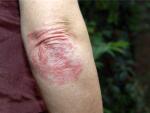
As many as 7.5 million people in the United States live with psoriasis, a chronic, or long-term, condition causing itchy, scaly red patches to form on the skin. Even though Caucasians are diagnosed with psoriasis more often than people of other ethnicities, it’s still possible for members of minority groups to develop this condition. Recent studies suggest up to 1.9% of African Americans and 1.6% of Hispanics have some form of psoriasis.
But even though so many people live with this condition, the impact of psoriasis on minority populations can be especially difficult. Many factors play into why psoriasis may be worse for minorities, including difficulty of diagnosis, underutilized medical care, and the condition’s psychological consequences.
If your psoriasis is hard to live with, talking with your doctor can help you find support and create an effective treatment plan to help manage your symptoms.
Diagnostic Challenges
There are several different types of psoriasis. Each type causes different symptoms, ranging from scaly patches to small, pus-filled bumps. But each type of psoriasis causes a reddish discoloration of your skin in areas affected by the disease. And while these red areas are easily visible on white skin, they can be easy to miss if your skin is a different color.
For many minorities, especially those with darker skin, psoriasis can be hard to detect. Your doctor may have difficulty identifying red patches of skin, which may look purple in color, especially if your psoriasis doesn’t cause scaling or pustules. In some cases, psoriasis is mistakenly diagnosed as other conditions causing skin discoloration, like fungal infections and cutaneous lupus. If you doctor can’t make a diagnosis based on a physical examination, a skin biopsy can help distinguish psoriasis from other skin conditions.
Underutilized Healthcare
According to recent studies, minorities are about 40% less likely to seek out treatment for their psoriasis. Also, many minority patients see doctors only half as often as Caucasian patients. While the exact reasons for this difference aren’t known, minorities may underutilize healthcare resources due to a lack of private insurance coverage and access to physicians who specialize in skin conditions.
Psychological Consequences
Because of the nature of psoriasis, and how it affects skin appearance, living with this condition can cause profoundly negative psychological consequences. This is especially true if large areas of skin are affected. Unfortunately, psoriasis still carries a social stigma, and many people who don’t understand the condition fear contact with those living with it.
Some studies suggest Asian Americans often have psoriasis that covers a larger percentage of the body compared to whites. Additionally, psoriasis can cause lasting discoloration of the skin, even after a flare-up is over. This discoloration often leads to embarrassment and social isolation that make psychological issues worse.
If you have psoriasis, you may feel ashamed, self-conscious, angry, frustrated, and helpless in the face of your condition. These feelings are completely normal. But not addressing these feelings, especially if they start to interfere with your normal daily activities or social life, can increase the psychological impacts of living with psoriasis and make finding help harder.
Finding Support
It may be difficult to live with psoriasis, especially if you’re a minority, but you’re not alone. There are many other people living with this condition who know exactly what you’re going through. Talk to your doctor about community resources and support groups for people living with psoriasis, some of which may be geared toward minorities. Also, organizations like the National Psoriasis Foundation offer online support and a chance to connect with another person who has the condition.






























